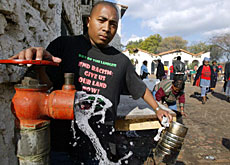Swiss propose plan for fair supply of water

The Swiss authorities and private firms have drawn up a plan aimed at ensuring water supplies under private control are distributed fairly in developing countries.
But non-governmental organisations claim the only way to ensure water reaches everyone is to keep it in public hands.
The group includes the Swiss Agency for Development and Cooperation (SDC) and the State Secretariat for Economic Affairs (Seco), along with a number of private companies, including Switzerland’s second-largest insurer, Swiss Re.
The plan is intended to give a clear set of guidelines for future public/private water distribution projects to ensure they are carried out in the public interest.
A key provision is a code of conduct aimed at preventing local authorities from handing out water supply contracts to favoured parties.
Increasing privatisation
Thomas Streiff, Director of Group Sustainability Management at Swiss Re, says the plan was drawn up in reaction to the private sector’s increasing involvement in the supply of water services around the world.
“If the trend continues in this fashion, we will have two choices: either we oppose this development, or we identify all the weak points together with the parties concerned, in an effort to create the right conditions,” he said.
But NGOs say the plan doesn’t go far enough because the code of conduct is not legally binding. They are calling for an international convention governing water supply contracts.
Katherine Kummer, an analyst at EcoConsult who is advising the SDC, says that although an international convention would help to improve the situation, it is not likely to be created in the near future.
Kummer says the Swiss initiative has had to stay flexible for practical reasons.
“That’s why we are concentrating on business recommendations that allow the parties involved to freely adopt and apply them as they wish.”
Stronger foothold
The private sector’s foothold in the water supply market is strengthening mainly because the public sector in many countries does not have the funds or expertise to supply water to the population.
Over the past ten years, the World Bank, development funds and the private sector have invested more than SFr39 million into water projects involving private firms.
There is also widespread support from governments for the use of private companies to supply public services.
At the third World Water Forum held in Kyoto in March, ministers recommended building partnerships between the private and public sectors.
They argued such partnerships allow a larger number of people in developing countries to gain increased access to drinking water.
Unequal partnerships
But developing countries and NGOs oppose private sector involvement in water distribution altogether. They claim that water is a public right, and should therefore not be treated as a commodity.
They claim public-private partnerships often have negative consequences, such as uneven contracts, where one party in the partnership has more power than the other.
Critics also argue that water is often only supplied to urban areas under these partnerships. Western private firms, they say, are often unwilling to invest in water services to rural areas or city slums, where they cannot make a long-term profit.
swissinfo, Hansjörg Bollinger (Translation: Tania Peitzker)
The plan includes guidelines to ensure that private companies involved in water distribution act in the public interest.
The World Bank, private companies and governments have voiced their support for public-private partnerships.
The private sector is increasingly involved in water distribution, as national public sectors often cannot afford to run their water networks alone.
But some NGOs and developing countries say water supplies should remain in the public sector’s hands to ensure they are run in the interest of the public.
NGOs have also criticised the Swiss plan for not including legally binding rules for public-private partnerships.

In compliance with the JTI standards
More: SWI swissinfo.ch certified by the Journalism Trust Initiative











You can find an overview of ongoing debates with our journalists here . Please join us!
If you want to start a conversation about a topic raised in this article or want to report factual errors, email us at english@swissinfo.ch.